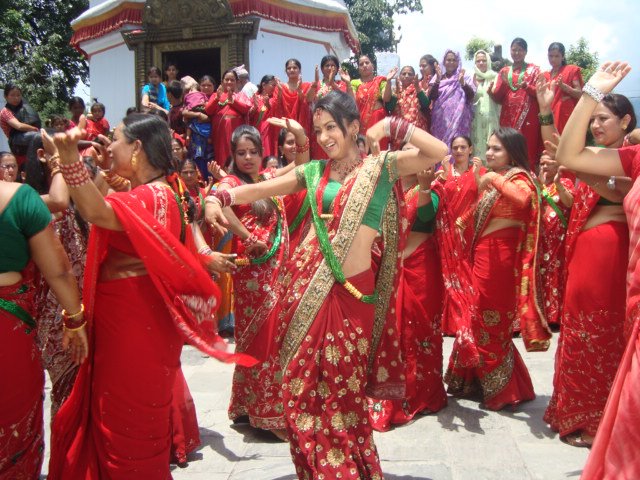Teej, the festival of women in Nepal
There is a special festival for women in Nepal – Teej. The festival has been celebrated by the women by dancing and eating delicacies. On the festival unmarried women worship Lord Shiva in hopes to find a husband like the god himself. Married women celebrate to wish the health and the long life of their husbands.
5 Teej specialites
- Red Saree – like that of the bride
- Teej Songs
- Teej dances
- Worshiping Lord Shiva
- Fasting
The festival starts on the Bhadra Shukla Dwitiya and ends on the Panchami (4 days long).
- First Day – Dar Khane (Women eat food late at night so that it is easy to stay fasting the next day)
- Second Day – Fasting – worshiping, singing and dancing the whole day.
- Third Day – Ganesh Chaturthi puja
- Fourth Day – Rishi Panchami – worshiping and finishing the festival.
Video report:
Dar Khane
This is the day when women eat as much as they can to prepare themselves not to eat the next day. On the day, people gather at a place, celebrate by singing and dancing on Teej songs and eat the best food they can prepare.
Dar usually include sweets, rice pudding, sel-roti, fruits and other foods. These days, Dar celebration starts well ahead of the actual day. It has developed into an excuse to gather and have fun.
Teej Day
On the main day, women start their day by cleaning their bodies and worship Lord Shiva. They team up with friends and neighbours to forma a Shava Mandapa. Others visit Shiva temples like Pashupati in Kathmandu and celebrate by singing and dancing in the public places. Teej songs are special songs that are written for the particular day.
Women wear colourful dresses and ornaments on the day.
Ganesh Chaturthi
The third day of Teej is the day of Ganesh, the son of Lord Shiva. On the day, huge celebrations are organized in India. In Nepal people steal on the day and it is believed that stealing is excused on the day. That practice has however diminished because of the criminal nature of the practice.
Rishi Panchami
The fourth day of the festival is celebrated by worshiping Rishi. They clean up their body by using 365 Datiwan sticks to represent every day of the year. The visit nearby river, lake or well to bath and clean up. The plant Datiwan is considered a multipurpose plant. Everything including leaf, flower, roots, stalk, and seeds of Datiwan are used as medicine in Ayurveda. 7 Rishis (learned people of the past) are worshiped on the day.
In 2018 – Teej is on September 12, Ganesh Chauthi on September 13, and Rishi Panchami on Septermber 14.



